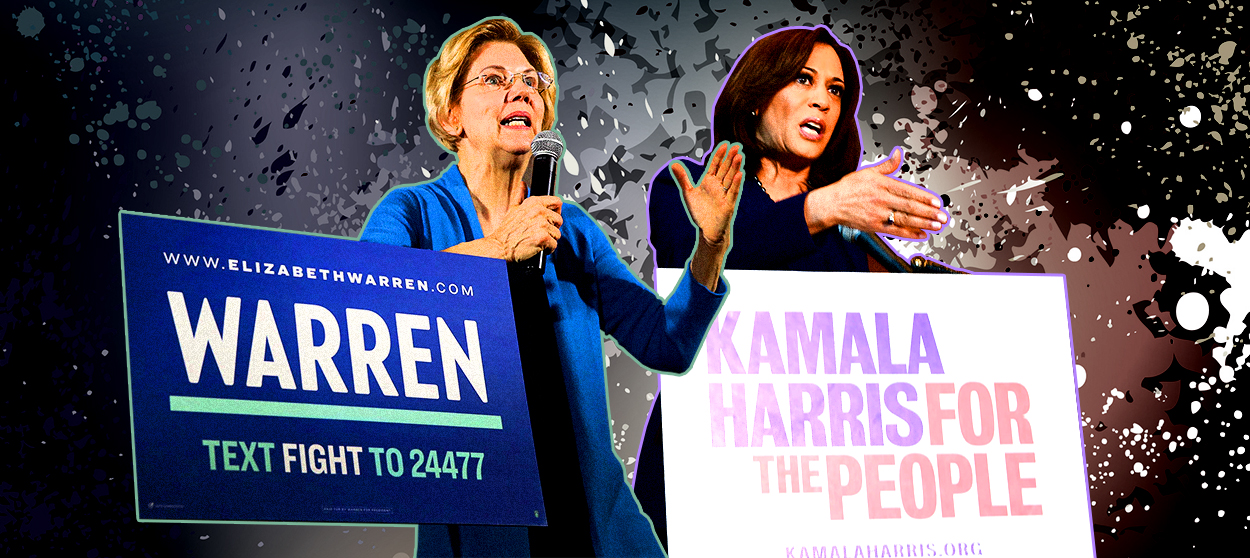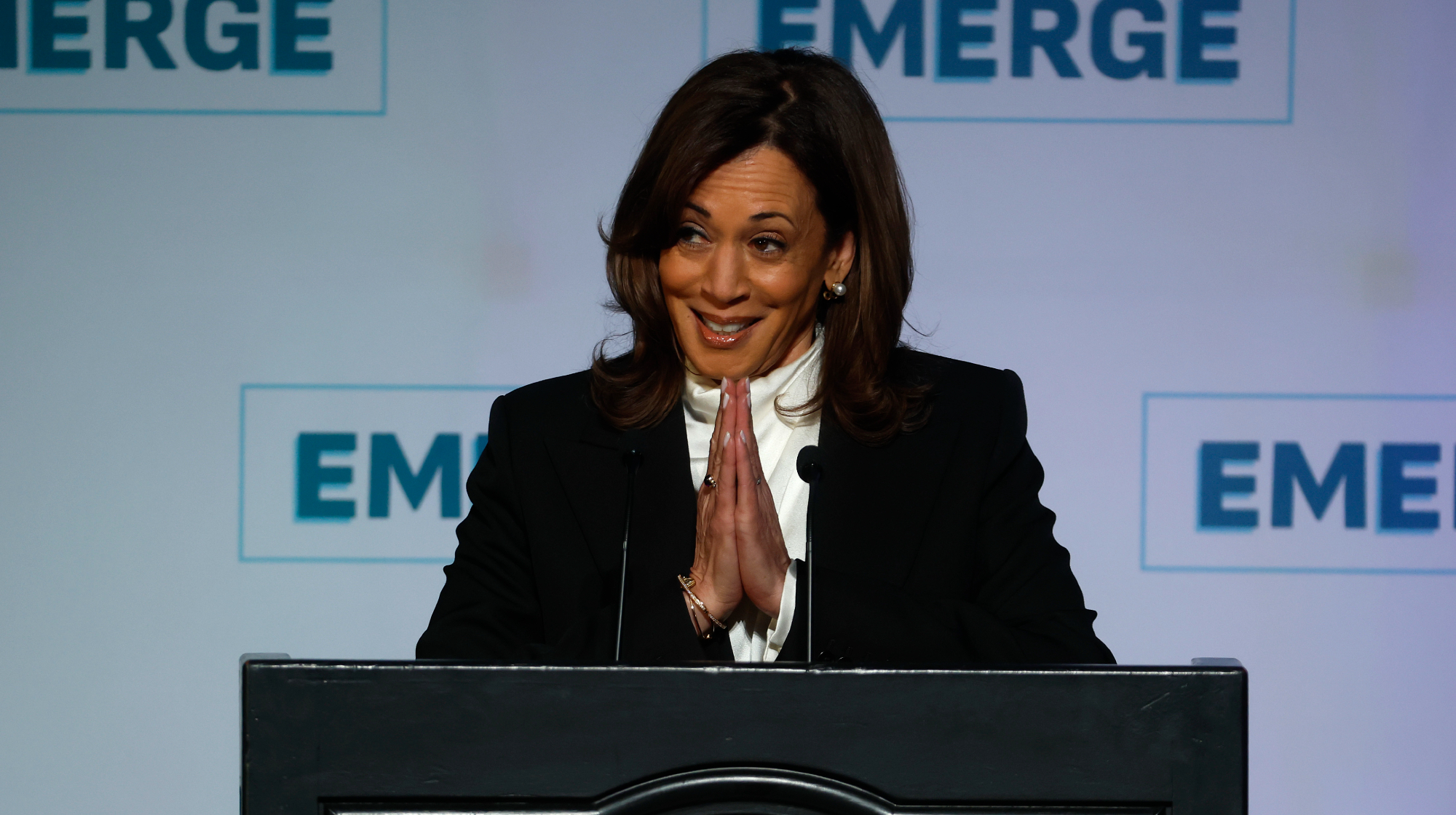Democrats aren't serious about reparations
Race-neutral tax credits do not count


A free daily email with the biggest news stories of the day – and the best features from TheWeek.com
You are now subscribed
Your newsletter sign-up was successful
Since Ta-Nehisi Coates published his landmark article "The Case for Reparations," the idea of paying the descendants of slaves some sort of compensation has been a regular area of discussion. It has come up in the 2020 Democratic primary contest, with numerous candidates expressing at least rhetorical support. Three candidates so far have come out in favor. Elizabeth Warren says: "We must confront the dark history of slavery and government-sanctioned discrimination in this country." Kamala Harris says: "I'm serious about taking an approach that would change policies and structures and make real investments in black communities." Julian Castro endorsed the policy more recently, saying, "I have long thought that this country would be better off if we did find a way to do that."
But there is reason to doubt the seriousness of these sentiments. There is a huge need for something like reparations, but so far none of these candidates has evinced anything like the ferocious radicalism that would require.
At a basic level, the case for some kind of reparations is strong. It is simply inarguable that black Americans have faced systematic economic looting throughout American history. Slave labor created enormous profits for white businesses across the antebellum U.S., not just the South — indeed, Wall Street ran a huge trade in slave-backed securities and other instruments. Under Jim Crow, blacks were basically enserfed, with similar extractive results. Blacks were frozen out of many key New Deal economic structures, especially government-insured home loans — the key route to middle-class wealth after the Second World War.
The Week
Escape your echo chamber. Get the facts behind the news, plus analysis from multiple perspectives.

Sign up for The Week's Free Newsletters
From our morning news briefing to a weekly Good News Newsletter, get the best of The Week delivered directly to your inbox.
From our morning news briefing to a weekly Good News Newsletter, get the best of The Week delivered directly to your inbox.
Even when blacks got some access to mortgage finance after the Civil Rights Movement, they still faced discrimination up to this day — indeed, they suffered worst of all major race groups from the botched response to the post-2008 foreclosure crisis, which devastated black wealth. While Wall Street was bailed out, the fraction of black homeowners underwater on their mortgages increased by 20-fold from 2007-2013, and average black home equity is still down $16,700 from its 2007 peak as of 2016.
Those inequalities transmit themselves down the generations, through inheritance and ongoing racism. That history and reality is why there is such an enormous wealth gap between white and black Americans — $146,200 (or a 9.8-fold difference) measured at the median, or $760,700 (or a 6.4-fold difference) measured as an average.
So if we take one primary goal of reparations as closing the black-white wealth gap (as some advocates have proposed), the amounts involved would be very, very large. For instance, one estimate of Cory Booker's "baby bond" proposal — which would build up a social wealth fund of about $700 billion, and then pay out a means-tested lump sum to people turning 18 — found it would nearly close the median wealth gap.
That is a big policy. But even if that analysis is true, it would still miss the bulk of the wealth gap, because the median of any race group holds only a small fraction of its total wealth. If we want to adjust total wealth such that blacks would own a white-equivalent share relative to their fraction of the population, we would need to move $15.2 trillion (or 17.5 percent of total wealth) — either by giving blacks that much directly, or taking $7.6 trillion from whites. On the other hand, if you try to calculate the current worth of stolen slave labor, the result is roughly between $1.75 trillion and $12.5 quadrillion.
A free daily email with the biggest news stories of the day – and the best features from TheWeek.com
Those are fantastically huge sums, which probably accounts for why every Democrat expressing rhetorical support for reparations have not come out for anything close to a program of that scale. Warren supports a bill to give means-tested support to first-time minority home buyers — perhaps a worthy effort, but tiny compared to the wealth gap. Castro didn't even endorse compensation as an idea, saying instead he would appoint a commission to study the issue. Harris says that her LIFT Act — a race-neutral expansion of the Earned Income Tax Credit — would sort of count as reparations.
This reluctance is probably also motivated by the fact that reparations poll extremely badly. A 2016 Marist poll found 68 percent of American adults are against the idea, while Data Progress found it 21 points underwater. Even working-class people of color only supported it by 15 points in the latter poll. It's likely a safe bet than any actual worked-out $15 trillion bill would be a lot more unpopular than that.
But if that's the case, then why are these candidates even bothering with rhetorical support? If you're trying to move the public with forthright advocacy of a bold policy, that's one thing, but endorsing the idea only to retreat when the scale of the problem becomes clear is quite another. Far better to be straight with the public and simply admit that it's not within the realm of political possibility as you see it. Casting facially race-neutral egalitarian policy like the EITC as reparations is perhaps worst of all, as it doesn't actually achieve the goals in question while associating it with a very unpopular idea.
If Democrats think reparations need to happen, then let's have that debate. But don't give us penny-ante moderation cloaked in radical symbolism.
Ryan Cooper is a national correspondent at TheWeek.com. His work has appeared in the Washington Monthly, The New Republic, and the Washington Post.
-
 The ‘ravenous’ demand for Cornish minerals
The ‘ravenous’ demand for Cornish mineralsUnder the Radar Growing need for critical minerals to power tech has intensified ‘appetite’ for lithium, which could be a ‘huge boon’ for local economy
-
 Why are election experts taking Trump’s midterm threats seriously?
Why are election experts taking Trump’s midterm threats seriously?IN THE SPOTLIGHT As the president muses about polling place deployments and a centralized electoral system aimed at one-party control, lawmakers are taking this administration at its word
-
 ‘Restaurateurs have become millionaires’
‘Restaurateurs have become millionaires’Instant Opinion Opinion, comment and editorials of the day
-
 The billionaires’ wealth tax: a catastrophe for California?
The billionaires’ wealth tax: a catastrophe for California?Talking Point Peter Thiel and Larry Page preparing to change state residency
-
 Bari Weiss’ ‘60 Minutes’ scandal is about more than one report
Bari Weiss’ ‘60 Minutes’ scandal is about more than one reportIN THE SPOTLIGHT By blocking an approved segment on a controversial prison holding US deportees in El Salvador, the editor-in-chief of CBS News has become the main story
-
 Has Zohran Mamdani shown the Democrats how to win again?
Has Zohran Mamdani shown the Democrats how to win again?Today’s Big Question New York City mayoral election touted as victory for left-wing populists but moderate centrist wins elsewhere present more complex path for Democratic Party
-
 Millions turn out for anti-Trump ‘No Kings’ rallies
Millions turn out for anti-Trump ‘No Kings’ ralliesSpeed Read An estimated 7 million people participated, 2 million more than at the first ‘No Kings’ protest in June
-
 Democrats: Harris and Biden’s blame game
Democrats: Harris and Biden’s blame gameFeature Kamala Harris’ new memoir reveals frustrations over Biden’s reelection bid and her time as vice president
-
 ‘We must empower young athletes with the knowledge to stay safe’
‘We must empower young athletes with the knowledge to stay safe’Instant Opinion Opinion, comment and editorials of the day
-
 Harris rules out run for California governor
Harris rules out run for California governorSpeed Read The 2024 Democratic presidential nominee ended months of speculation about her plans for the contest
-
 Ghislaine Maxwell: angling for a Trump pardon
Ghislaine Maxwell: angling for a Trump pardonTalking Point Convicted sex trafficker's testimony could shed new light on president's links to Jeffrey Epstein
